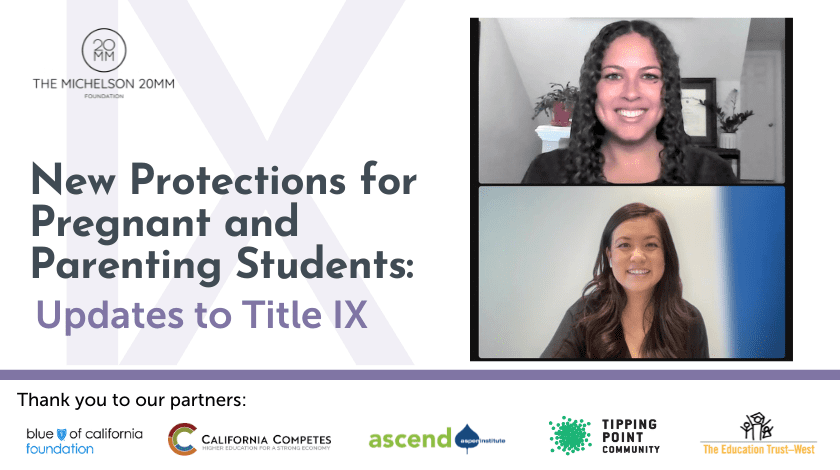By Dr. Queena Hoang
Student parents in California and throughout the nation face unique challenges and barriers to their success. Oftentimes, they are saddled with twice the student loan debt of their childless peers, and less than a third of parenting students graduate from undergraduate programs within six years. Despite the obstacles, student parents tend to be among the best students, having higher GPAs on average.
Unfortunately, colleges and universities contribute to many of the barriers faced by student parents. Stigmatizing behavior runs rampant and discrimination has, in many ways, become the norm as many students are denied the courses they need or want, leading to withdrawal or an inability to complete their studies. Student parents also struggle with navigating absences for doctor’s appointments, sick children, and childcare needs and are often restricted in participating in certain activities. Additionally, many campuses lack secure and private spaces for taking lactation breaks, which makes three- to four-hour lectures and back-to-back night classes particularly challenging. These difficulties underscore the need for greater support and accommodations for student parents in educational institutions. We can and must do better.
Recognizing this, New Protections for Pregnant and Parenting Students: Updates to Title IX, the latest webinar in our virtual learning series, explored how Title IX—a crucial federal law—provides support for pregnant and parenting students in almost every school in the United States. Led by subject matter expert, Jessica Lee, senior staff attorney at the University of California College of Law, San Francisco Center for Worklife Law, the conversation explored the history of the law and its promising, long overdue updates.
Despite being only 37 words long, Title IX is made effective through regulations issued by the United States Department of Education. The initial regulations were established in 1974 and remained largely unchanged until recently. In June of last year, the Department of Education released new proposed regulations, which are expected to be adopted by October of this year. These updates more clearly define “pregnancy” and “parent;” outline institutions’ obligations to provide reasonable accommodations and/or modifications to policies, practices, and procedures when needed for pregnancy or related conditions; and clearly prohibit stereotyping based on gender norms.
Since the 1970’s, Title IX covered anything that was pregnancy related, prohibiting discrimination on basis of pregnancy, childbirth, termination of pregnancy, and recovery. We learned in the webinar that the Department of Education is now including not only someone’s current pregnancy within Title IX, but also the potential for pregnancy, past pregnancy or conditions relating to pregnancy— including IVF and miscarriages. And for the first time ever, these new Title IX regulations are explaining what the law means by being a parent. It includes being a biological parent, adoptive parent, foster parents, and anyone who has or is seeking custody guardianship or visitation of a child under 18 or someone who is disabled and over 18.
To better provide accommodations for students with pregnancy related conditions, “the Department of Education will now require schools to provide reasonable modifications to their policies, practices or procedures for a student because of their pregnancy or related condition.” Each accommodation must also be provided on an individualized and voluntary basis. To ensure that these requests do not fall through the cracks, faculty, staff, and administrators receiving requests from students must inform the institution’s Title IX coordinator, who is then responsible for providing the student with information about pregnancy accommodations and leave lactation accommodations. Furthermore, the Title IX coordinators are required to oversee that individualized and interactive process to establish accommodations.
Throughout our virtual learning series, The State of Pregnant and Parenting Students in California, we heard directly from student parents about their experiences in college, explored policy opportunities to enhance supports for student parents and their families, and aimed to inspire collaboration across sectors to identify innovative solutions that better support and advocate for student parents and their families. As we wait for the final Title IX regulations to be approved and implemented on campuses across the country, we are encouraged by these new changes and are hopeful that parenting students will find more equitable and inclusive accommodations to better meet their needs.
To learn more about the Pregnant and Parenting Student Initiative, please visit our webpage. We also invite you to view the recording and access additional resources mentioned during the event.
Michelson 20MM is a private, nonprofit foundation working toward equity for underserved and historically underrepresented communities by expanding access to educational and employment opportunities, increasing affordability of educational programs, and ensuring the necessary supports are in place for individuals to thrive. To do so, we work in the following verticals: Digital Equity, Intellectual Property, Smart Justice, Student Basic Needs, and Open Educational Resources (OER). Co-chaired and funded by Alya and Gary Michelson, Michelson 20MM is part of the Michelson Philanthropies network of foundations.
To sign up for our newsletter, click here.
